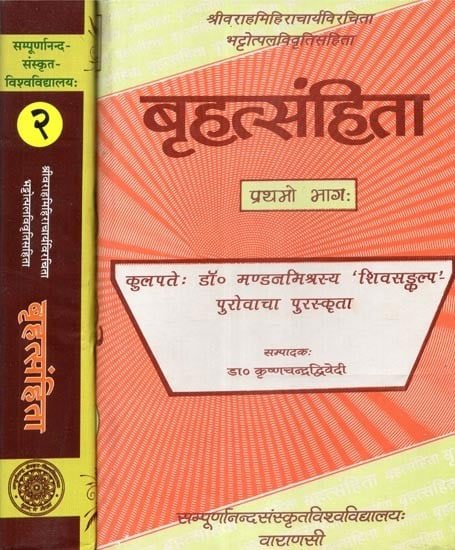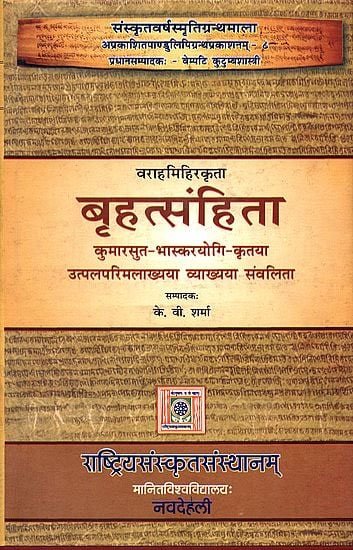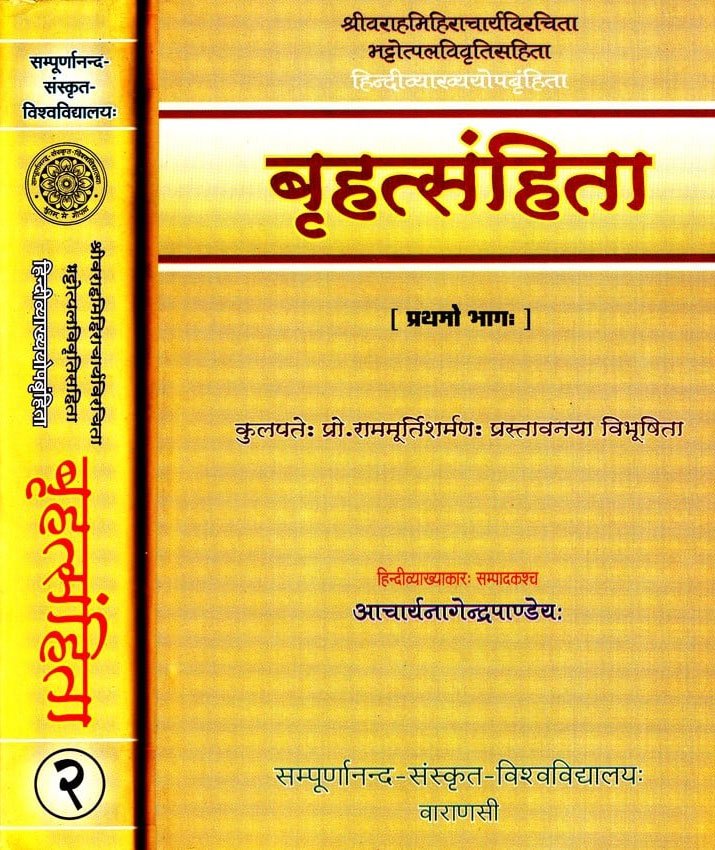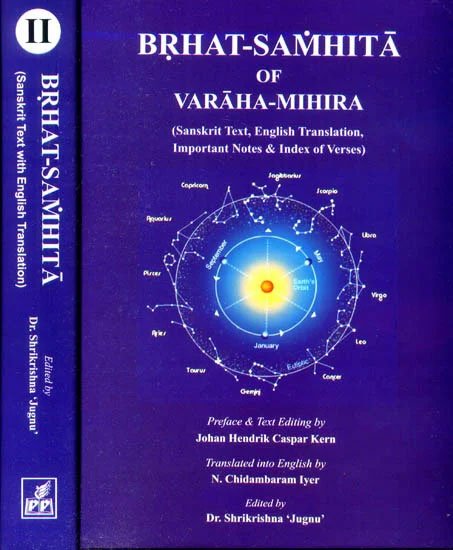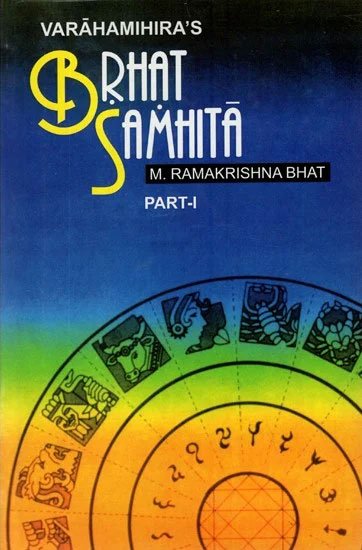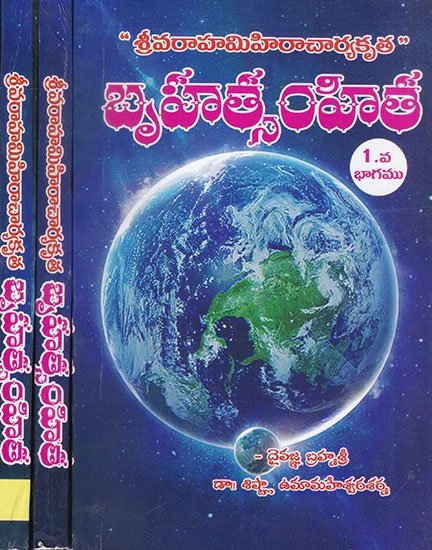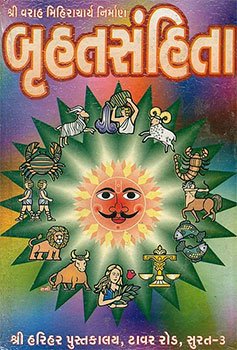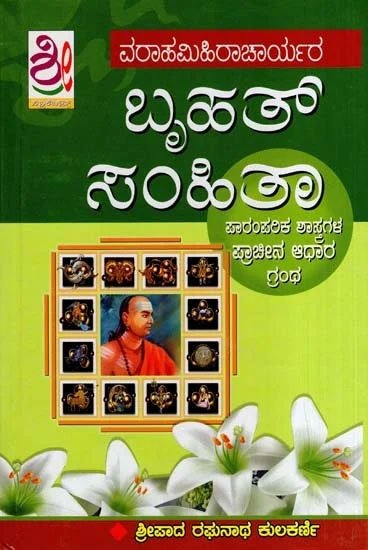Brihat-samhita [sanskrit]
26,560 words
The Sanskrit text of the Brihat-samhita from the 6th-century authored by Varaha Mihira in present-day Ujjain, India. It primarily deals with astrology and astronomy but is presented as an encyclopedia of knowledge.
Verse 9.44
शिखिभयमनलाभे शस्त्रकोपश्च रक्ते कनकनिकषगौरे व्याधयो दैत्यपूज्ये ।
हरितकपिलरूपे श्वासकासप्रकोपः पतति न सलिलं खाद्भस्मरूक्षासिताभे ॥ ४४ ॥
śikhibhayamanalābhe śastrakopaśca rakte kanakanikaṣagaure vyādhayo daityapūjye |
haritakapilarūpe śvāsakāsaprakopaḥ patati na salilaṃ khādbhasmarūkṣāsitābhe || 44 ||
The Sanskrit text of Verse 9.44 is contained in the book Brihata Samhita (Sanskrit Text with Hindi Translation) by Pandit Achyutananda Jha. This book is available online or you could buy the latest edition:
Read online Buy now! The Sanskrit text by Pandit Achyutananda Jha (2001)
Glossary of Sanskrit terms
Note: This extracts Sanskrit terms and links to English definitions from the glossary, based on an experimental segmentation of verse (9.44). Some terms could be superfluous while some might not be mentioned. Click on the word to show English definitions.
Shikhibhaya, Analabha, Shastrakopa, Rakta, Rakti, Kanaka, Nikasha, Gaura, Vyadhi, Daityapujya, Harita, Kapilarupa, Shvasakasa, Prakopa, Patat, Salila, Kha, Bhasmaruksha, Asitabha,
Analysis of Sanskrit grammar
Note: this is an experimental feature and only shows the first possible analysis of the Sanskrit text (Verse 9.44). If the system was successful in segmenting the sentence, you will see of which words it is made up of, generally consisting of Nouns, Pronouns, Verbs, Participles and Indeclinables. Click on the link to show all possible derivations of the word.
- Line 1: “śikhibhayamanalābhe śastrakopaśca rakte kanakanikaṣagaure vyādhayo daityapūjye ”
- śikhibhayam -
-
śikhibhaya (noun, masculine)[adverb], [accusative single]śikhibhaya (noun, neuter)[adverb], [nominative single], [accusative single]
- analābhe -
-
analābhā (noun, feminine)[nominative dual], [vocative single], [vocative dual], [accusative dual]
- śastrakopaś -
-
śastrakopa (noun, masculine)[nominative single]
- ca -
-
ca (indeclinable conjunction)[indeclinable conjunction]ca (noun, masculine)[compound], [vocative single]ca (noun, neuter)[compound], [vocative single]
- rakte -
-
rakta (noun, masculine)[locative single]rakta (noun, neuter)[nominative dual], [vocative dual], [accusative dual], [locative single]raktā (noun, feminine)[nominative dual], [vocative single], [vocative dual], [accusative dual]rakti (noun, feminine)[vocative single]√rag -> rakta (participle, masculine)[locative single from √rag class 1 verb]√rag -> rakta (participle, neuter)[nominative dual from √rag class 1 verb], [vocative dual from √rag class 1 verb], [accusative dual from √rag class 1 verb], [locative single from √rag class 1 verb]√rag -> raktā (participle, feminine)[nominative dual from √rag class 1 verb], [vocative single from √rag class 1 verb], [vocative dual from √rag class 1 verb], [accusative dual from √rag class 1 verb]√raj -> rakta (participle, masculine)[locative single from √raj class 1 verb], [locative single from √raj class 4 verb]√raj -> rakta (participle, neuter)[nominative dual from √raj class 1 verb], [vocative dual from √raj class 1 verb], [accusative dual from √raj class 1 verb], [locative single from √raj class 1 verb], [nominative dual from √raj class 4 verb], [vocative dual from √raj class 4 verb], [accusative dual from √raj class 4 verb], [locative single from √raj class 4 verb]√raj -> raktā (participle, feminine)[nominative dual from √raj class 1 verb], [vocative single from √raj class 1 verb], [vocative dual from √raj class 1 verb], [accusative dual from √raj class 1 verb], [nominative dual from √raj class 4 verb], [vocative single from √raj class 4 verb], [vocative dual from √raj class 4 verb], [accusative dual from √raj class 4 verb]√rañj -> rakta (participle, masculine)[locative single from √rañj class 1 verb], [locative single from √rañj class 4 verb]√rañj -> rakta (participle, neuter)[nominative dual from √rañj class 1 verb], [vocative dual from √rañj class 1 verb], [accusative dual from √rañj class 1 verb], [locative single from √rañj class 1 verb], [nominative dual from √rañj class 4 verb], [vocative dual from √rañj class 4 verb], [accusative dual from √rañj class 4 verb], [locative single from √rañj class 4 verb]√rañj -> raktā (participle, feminine)[nominative dual from √rañj class 1 verb], [vocative single from √rañj class 1 verb], [vocative dual from √rañj class 1 verb], [accusative dual from √rañj class 1 verb], [nominative dual from √rañj class 4 verb], [vocative single from √rañj class 4 verb], [vocative dual from √rañj class 4 verb], [accusative dual from √rañj class 4 verb]
- kanaka -
-
kanaka (noun, masculine)[compound], [vocative single]kanaka (noun, neuter)[compound], [vocative single]
- nikaṣa -
-
nikaṣa (noun, masculine)[compound], [vocative single]nikaṣa (noun, neuter)[compound], [vocative single]
- gaure -
-
gaura (noun, masculine)[locative single]gaura (noun, neuter)[nominative dual], [vocative dual], [accusative dual], [locative single]gaurā (noun, feminine)[nominative dual], [vocative single], [vocative dual], [accusative dual]
- vyādhayo* -
-
vyādhi (noun, masculine)[nominative plural], [vocative plural]
- daityapūjye -
-
daityapūjya (noun, masculine)[locative single]
- Line 2: “haritakapilarūpe śvāsakāsaprakopaḥ patati na salilaṃ khādbhasmarūkṣāsitābhe ”
- harita -
-
harita (noun, masculine)[compound], [vocative single]harita (noun, neuter)[compound], [vocative single]
- kapilarūpe -
-
kapilarūpa (noun, masculine)[locative single]kapilarūpa (noun, neuter)[nominative dual], [vocative dual], [accusative dual], [locative single]
- śvāsakāsa -
-
śvāsakāsa (noun, masculine)[compound], [vocative single]
- prakopaḥ -
-
prakopa (noun, masculine)[nominative single]
- patati -
-
patat (noun, masculine)[locative single]patat (noun, neuter)[locative single]√pat -> patat (participle, masculine)[locative single from √pat class 1 verb]√pat -> patat (participle, neuter)[locative single from √pat class 1 verb]√pat (verb class 1)[present active third single]
- na -
-
na (indeclinable particle)[indeclinable particle]na (noun, masculine)[compound], [vocative single]na (noun, neuter)[compound], [vocative single]
- salilam -
-
salila (noun, masculine)[adverb], [accusative single]salila (noun, neuter)[adverb], [nominative single], [accusative single]salilā (noun, feminine)[adverb]
- khād -
-
kha (noun, masculine)[adverb], [ablative single]kha (noun, neuter)[adverb], [ablative single]
- bhasmarūkṣā -
-
bhasmarūkṣa (noun, masculine)[compound], [vocative single]bhasmarūkṣa (noun, neuter)[compound], [vocative single]
- asitābhe -
-
asitābhā (noun, feminine)[nominative dual], [vocative single], [vocative dual], [accusative dual]
Other editions:
Also see the following editions of the Sanskrit text or (alternative) English translations of the Verse 9.44
Brhatsamhita with the Commentary of Bhattotpala
by Krishna Chandra Dwivedi (2016)
Publisher: Sampurnanand Sanskrit University; 1229 pages;
Buy now!
Brihat Samhita with the Commentary of Utpalapatimala of Yogisvara
by K. V. Sharma (2012)
Publisher: Rashtriya Sanskrit Sansthan, Janakpuri; 754 pages; ISBN-10; 8186111360; ISBN-13: 9788186111369
Buy now!
Brihat Samhita (Hindi Translation)
by K. V. Sharma (2002)
Publisher: Sampurnanand Sanskrit University; 2359 pages; ISBN-13: 9789387890008.
Buy now!
Brhat Samhita (English translation)
by N. Chidambaram Iyer (2022)
Publisher: Parimal Publication Pvt. Ltd.; 801 pages; Edited by Dr. Shrikrishna Jugnu; ISBN-10: 8171104215; ISBN-13: 9788171104215.
Buy now!
Brhat Samhita (English with notes)
by M. Ramakrishna Bhat (2010)
Publisher: Motilal Banarsidas Publishers Pvt. Ltd.; 1155 pages; ISBN-10: 8120810600; ISBN-13: 9788120810600.
Buy now!
Brhat Samhita (Telugu translation)
by Sishtla Umamaheswara Sharma (2020)
Publisher: Mohan Publications, Andhra Pradesh; 846 pages.
Buy now!Preview of verse 9.44 in Kannada sript:
ಶಿಖಿಭಯಮನಲಾಭೇ ಶಸ್ತ್ರಕೋಪಶ್ಚ ರಕ್ತೇ ಕನಕನಿಕಷಗೌರೇ ವ್ಯಾಧಯೋ ದೈತ್ಯಪೂಜ್ಯೇ ।
ಹರಿತಕಪಿಲರೂಪೇ ಶ್ವಾಸಕಾಸಪ್ರಕೋಪಃ ಪತತಿ ನ ಸಲಿಲಂ ಖಾದ್ಭಸ್ಮರೂಕ್ಷಾಸಿತಾಭೇ ॥ ೪೪ ॥
Brhat Samhita (Gujarati translation)
by - (2000)
Publisher: Shree Harihar Pustakalay, Surat; Author: Shri Varahamihira Acharya (શ્રી વરાહમિહીરાચાર્ય); 432 pages.
Buy now!Preview of verse 9.44 in Gujarati sript:
શિખિભયમનલાભે શસ્ત્રકોપશ્ચ રક્તે કનકનિકષગૌરે વ્યાધયો દૈત્યપૂજ્યે ।
હરિતકપિલરૂપે શ્વાસકાસપ્રકોપઃ પતતિ ન સલિલં ખાદ્ભસ્મરૂક્ષાસિતાભે ॥ ૪૪ ॥
Brhat Samhita (Kannada translation)
by Sripada Raghunatha Kulkarni (2021)
Publisher: Srinidhi Publications, Bangalore; 668 pages with illustrations.
Buy now!Preview of verse 9.44 in Kannada sript:
ಶಿಖಿಭಯಮನಲಾಭೇ ಶಸ್ತ್ರಕೋಪಶ್ಚ ರಕ್ತೇ ಕನಕನಿಕಷಗೌರೇ ವ್ಯಾಧಯೋ ದೈತ್ಯಪೂಜ್ಯೇ ।
ಹರಿತಕಪಿಲರೂಪೇ ಶ್ವಾಸಕಾಸಪ್ರಕೋಪಃ ಪತತಿ ನ ಸಲಿಲಂ ಖಾದ್ಭಸ್ಮರೂಕ್ಷಾಸಿತಾಭೇ ॥ ೪೪ ॥
![Brihat-samhita [sanskrit] - book cover](/uploads/a/Brihat-Samhita-Sanskrit.jpg)
